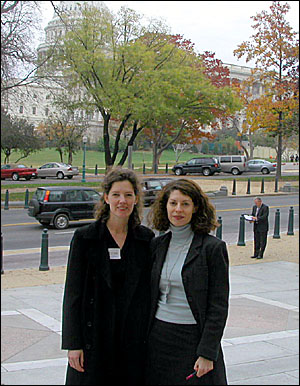 |
 | ||
 |
||
|
Reporter's Notebook
 Sasha Aslanian of American RadioWorks and Jill Barshay of Congressional Quarterly. Few things in Washington are easier to demonize than the lobbying industry. From the Jack Abramoff scandals to Vice President Dick Cheney's secret meetings with energy executives, the most questionable kinds of lobbying transactions are a big part of what gives Washington a bad name. But lobbying, like any other business, attracts a whole range of characters seeking a wide range of outcomes, from legislative perks for casinos to boosting tax incentives for research and development investments. So at the request of American RadioWorks, I took a fresh look at the lobbying side of my beat as an economic policy reporter for Congressional Quarterly. We agreed to profile the lobbying campaign surrounding Net neutrality, the crusade to keep high-speed Internet traffic on a level playing field. The Net neutrality battle points up the disparate forms that lobbying can take, from the strategic release of "viral videos" addressing the issue to the hiring of a former senator to talk to his buddies on the Hill about the matter. Net neutrality was also the biggest lobbying scrum of 2006, pitting telephone and cable companies like AT&T and Comcast against Internet giants like Google and eBay. Putting this documentary together brought home how much lobbying, like most every other information-based business, has evolved in more sophisticated ways. A big campaign like Net neutrality will bring in a whole host of consultants, message crafters, trade groups, coalitions, front groups, think tanks, policy intellectuals, public relations firms and advertising agencies. At the same time, a full-court lobbying press can be quite precision-minded. Companies hire a contracted lobbying hand for the sole purpose of engaging a single legislator or chief of staff. What I didn't anticipate was just how challenging it would be to report this story for radio. Lobbyists and congressional aides will often describe a closed-door meeting after the fact and I can write that up. But these sources wouldn't let a radio reporter with a microphone anywhere near an actual meeting where lobbying was taking place. At one point, I thought we had a fantastic anecdote for the story when producer Sasha Aslanian bumped into Senator Norm Coleman, a Republican from Minnesota, in the airport. He admitted he was undecided on the issue and showed the blast of e-mails he'd received from interest groups on his Blackberry. That same day, Google's spokesman told me that Vint Cerf, who holds the corporate title of Chief Internet Evangelist at Google, had flown from California to Washington. We'd been pleading to get interviews with Coleman. And at the end of the day, we'd pieced together that the two had met face-to-face in Coleman's office. Coleman's computer techie was so excited to see the Internet celebrity, I'd been told, that he ran down the hall to get his picture taken with Cerf. It was a great glimpse into how companies use a bit of star power to persuade in Washington. But we couldn't use any of it for our story because we weren't allowed to tape it. Likewise, we were blocked out of fundraisers entirely, even though this is where lobbying clout arguably weighs most heavily in the D.C. balance of power. And as is the case with all Washington stories, the act of reporting itself became a politically charged matter. Telephone lobbyists, representing the telecom companies that seemed to be getting the upper hand in the Net neutrality battle, were happy to talk on background, but not on tape. Seeking to remain as firmly on message as they could while they were making headway with legislators, telecom lobbyists only wanted us to talk with the spinmeisters who they had specifically hired to talk to the media. By contrast, Google, something of an underdog in this fight and also comparative novice in the lobbying world, was especially forthcoming. The search engine colossus opened its entire lobbying team, in-house and outside third parties, to us. Back to Imperial Washington |
||